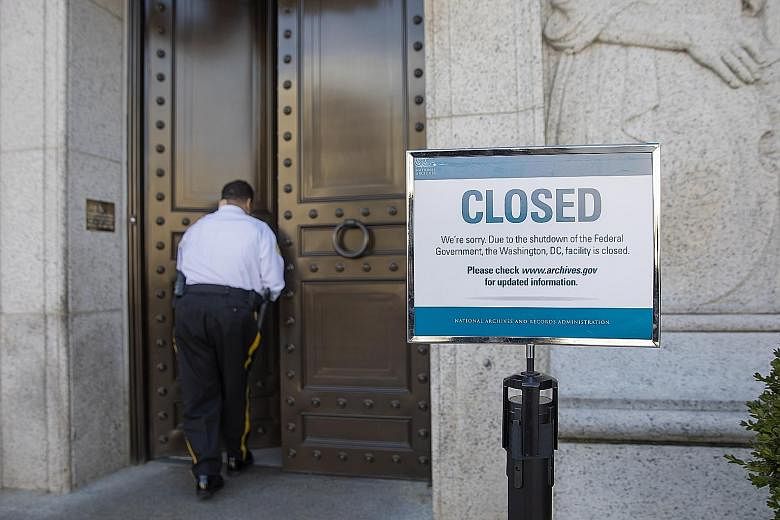WASHINGTON • The partial shutdown of the federal government, which began early yesterday, is unlikely to make much of an immediate dent in the growth of the US economy, but it could make life more difficult for millions of Americans in ways both big and small.
The shutdown could also contribute to the growing sense of worry on Wall Street, in part by raising fears about the ability of Congress to manage a more consequential deadline: The need to authorise an increase in government borrowing before the federal debt reaches the current limit, most likely in March.
President Donald Trump appeared unfazed by an economic threat his critics contend is of his own making and that he initially said he would "own".
"We are totally prepared for a very long shutdown," Mr Trump said last Friday, as he continued to insist he would veto any government funding Bill that did not include money to build a wall along the border with Mexico.
The direct economic consequences of the shutdown will be modest in the aggregate.
Congress has already approved funding for roughly three-quarters of the federal government, which will not be affected.
Standard and Poor's, the credit rating firm, estimates that shutting down the remainder could shave US$1.2 billion (S$1.65 billion) off the gross domestic product each week the government is closed. That is a very small fraction of the nation's annual economic output, which will be around US$20 trillion this year.
But it could inflict pain on as many as 500,000 government employees, who could be temporarily out of work during the holiday season.
Before the shutdown began, businesses around Washington that cater to government employees were bracing themselves for the worst, and were tiring of the annual shutdown theatrics that tend to occur around Christmas.
"It costs billions of dollars every time they do this, not to mention the impact on consumer confidence every time they threaten to do this," said Mr Mike Brey, owner of two Hobby Works shops in Maryland.
Past government shutdowns have also caused scattershot disruptions to the broader economy.
The most recent prolonged shutdown, in October 2013, lasted 16 days. Analysts subsequently concluded that the shutdown caused a measurable loss of economic activity in the fourth quarter of 2013.
Several analysts estimated the reduction in annual economic growth at around 0.1 percentage points, costing the nation US$24 billion.
The White House is so far portraying a sense of calm.
Mr Kevin Hassett, chairman of the White House's Council of Economic Advisers, said in an interview last Friday that the effect of a brief shutdown would most likely represent a "rounding error" on fourth-quarter economic growth, which he projects to be near 3 per cent.
NYTIMES
PREVIOUS INSTANCES
FEB 9, 2018
Republican Senator Rand Paul of Kentucky single-handedly triggered the shortest shutdown in history with a filibuster that forced the US Senate to miss a midnight deadline to approve a spending deal that Mr Paul regarded as wasteful.
As a result, the government technically ran out of money at 12.01am that Friday. But Congress members worked through the night and approved the Bill at roughly 5.30am the same day, allowing the government to function normally with no interruptions.
JAN 20-22, 2018
Weeks of haggling between the White House and congressional Democrats focused largely on immigration issues, with Democrats pushing for protections for "Dreamers" who went to the United States as young children.
Senate minority leader Chuck Schumer repeatedly complained about President Donald Trump agreeing to something face to face and then saying or tweeting something completely different. Mr Schumer said dealing with Mr Trump was "like negotiating with Jell-O".
The shutdown lasted just short of three full days, starting on a Friday night and ending the following Monday, when Democrats dropped their demands in exchange for a promise from Senate majority leader Mitch McConnell that he would address the immigration issue in the coming weeks. The deal was largely unpopular among Democrat voters, who blamed their representatives for caving in too easily.
DEC 5, 1995 TO JAN 6, 1996
The longest shutdown in US history deals with the provision to balance the budget within seven years. Republicans wanted then President Bill Clinton to use the Congressional Budget Office's (CBO) economic forecasts, not the more optimistic Office of Management and Budget forecasts. The Republicans gave in, and Mr Clinton submitted a plan with CBO forecasts ensuring a balanced budget within seven years.
Sources: Associated Press, The Atlanta Journal-Constitution


